- 보통명사화한 ‘보이콧’ ‘멘터링’ ‘샌드위치’ 등은 원래 사람 이름이었다. 영어에는 이렇듯 사람 이름뿐 아니라 특정 장소나 직업이 여러 단어로 파생한 경우가 많다. 거꾸로 특정 장소나 직업이 사람 이름이 되는 경우도 있다. eponym, aptronym, patronym은 무심코 지나친 단어의 어원을 이해하고, 유명 인사의 이름이 내포한 재미있는 의미도 살펴보는 기회를 제공한다.

에포님이란 특정 장소, 부족, 연대, 발견, 혹은 다른 것의 근원이 되는 또는 그렇게 생각되는 사람-실제 존재했든 허구의 인물이든-의 이름이다.
(An eponym is the name of a person, whether real or fictitious, which has or is thought to have given rise to the name of a particular place, tribe, era, discovery, or other item.)
로마(Rome)가 대표적인 예다. 늑대에게서 자라 로마를 건설했다는 로물루스(Romulus)가 Rome이란 국명의 유래가 됐다. 한편 색소폰(saxophone)의 에포님은 이 악기를 발명한 벨기에 음악가 아돌프 삭스(Adolphe Sax)다. Hansen´s disease(한센병)의 에포님은 이 병을 연구한 노르웨이 의학자 한센(Gerhard Henrik Armauer Hansen)이고, 루게릭병(Lou Gehrig´s disease)의 에포님은 이 병으로 죽은 미국 프로야구 선수 루이스 게릭(Henry Louis Gehrig)이다. 아르키메데스 원리(Archimedes´ principle), 일명 부력법칙(physical law of buoyancy)의 에포님은 익히 알려진 대로 고대 그리스의 아르키메데스다. 알칼로이드(alkaloid) 성분인 니코틴(nicotine)은 담배(tobacco plant)의 품종인 Nicotiana tabacum에서 따왔다. 그리고 이 단어는 1550년 담배와 담배씨를 브라질에서 파리로 보내 의학적 사용을 촉진시켰던 당시 포르투갈 주재 프랑스 대사 장 니코(Jean Nicot)의 이름에서 유래했다.
주요 에포님을 알아보자.
mentor
원래 고유명사(Mentor)인데 보통명사(mentor)화했다. 충실하고 현명한 조언자 또는 스승의 의미로 쓰인다. mentor의 역할과 행위를 mentoring, 피보호자 또는 피후견인을 mentee 혹은 protege라 한다. protege는 불어이며 영어의 protected에 해당한다.
그리스 신화에서 멘터(Mentor)는 만년에 오디세우스의 친구였으며, 오디세우스는 트로이전쟁에 참가하면서 멘터에게 아들 텔레마쿠스와 궁전을 맡겼다.
(In Greek mythology, Mentor was, in his old age, a friend of Odysseus. When Odysseus left for the Trojan War he placed Mentor in charge of his son, Telemachus, and of his palace.)
Today the word mentor means a trusted friend, counselor or teacher, usually a more experienced person. Some professions have “mentoring programs” in which newcomers are paired with more experienced people in order to obtain good examples and advice. And schools sometimes have mentoring programs for new students or students who are having difficulties.
(오늘날 mentor라는 단어는 신뢰하는 친구, 조언자, 교사, 흔히 경험이 풍부한 사람을 의미한다. 초심자가 좋은 본보기와 충고를 얻기 위해 경험이 많은 사람과 한 조가 되는 멘터링 프로그램을 갖춘 직장도 있다. 일부 학교에서도 신입생이나 곤란을 겪는 학생을 위한 멘터링 프로그램을 운영한다.)
boycott
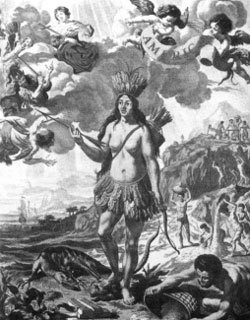
17세기 유럽의 한 지리학 서적에 묘사된 아메리카 대륙.
보이콧(boycott)은 동사로 ‘불매 동맹을 하다’ ‘(회의 등의) 참가를 거부하다’, 명사로 ‘불매 동맹’이란 의미다. 이 단어 역시 사람 이름에서 유래했다.
The word boycott entered the English language during the Irish “Land War” and is derived from the name of (retired) Captain Charles Boycott(1832~1897), the estate agent of an absentee landlord, the Earl Erne who was subject to social ostracism organized by the Irish Land League in 1880.
(boycott이란 단어는 이른바 ‘아일랜드 토지전쟁’ 때 생겨난 말이다. 아일랜드 부재지주 언 백작의 영지 관리를 맡은 퇴역 육군대위 찰스 보이콧(1832~1897)의 이름에서 비롯됐다. 그는 1880년 아일랜드 토지동맹의 조직적 저항으로 사회에서 매장됐다.) ※ostracism(오스트라시즘): 조가비나 도기 파편에 이름을 쓰는 투표 방식으로 위험인물을 추방한 고대 그리스의 도편 추방. suffer social ostracism(사회에서 매장되다)
In September of 1880 tenants demanded from Boycott the “Three Fs”(fair rent, fixity of tenure and free sale). He not only refused but also ejected them from the land. The Land League proposed that, rather than resorting to violence, everyone in the locality should refuse to deal with him. Boycott soon found himself isolated - his workers stopped work in the fields and stables, as well as the house.
(1880년 9월 소작인들은 보이콧에게 ‘3F(공정한 소작료, 지속적 소작, 자유판매)’를 요구했다. 하지만 보이콧은 이를 거부했을 뿐만 아니라 이러한 요구를 한 소작인들을 영지에서 쫓아냈다. 토지동맹은 폭력은 쓰지 말되, 어느 누구도 보이콧과 상대해선 안 된다고 결의했다. 일꾼들이 집은 물론 들과 마구간에서 하던 작업을 중단함에 따라 보이콧은 고립되고 말았다.) ※아무에게 무엇을 요구하다를 영작하면, demand a thing from a person 혹은 demand a thing of a person이다. demand a thing to a person은 틀리다.
Local businessmen stopped trading with him, and the local postman refused to deliver mail. The concerted action taken against him meant that Boycott was unable to hire anyone to harvest the crops in his charge.
(지역 상인들은 그와 거래하지 않았고, 우편배달부도 우편물 배송을 거부했다. 그에게 맞서는 일치된 행동으로 말미암아 보이콧은 자신이 관리하는 농작물을 수확할 사람을 고용할 수 없었다.)
Fifty(50) Orangemen from County Cavan travelled to Lord Erne´s estate to save the harvest. They were escorted by one thousand policemen and soldiers. This fact despite Boycott´s complete social ostracism meant that he was actually in no danger of being harmed. Moreover, this protection ended up costing far more than the harvest was worth. After the harvest, the “boycott” was successfully continued. Within weeks Boycott´s name was everywhere. It was used by The Times in November 1880 as a term for organized isolation.
(카번주에서 50명의 오렌지 당원이 추수를 위해 언 백작의 영지로 들어왔다. 그들은 1000명의 경찰과 군인의 호위를 받았다. 이러한 사실은 보이콧이 사회적으로 매장됐음에도 실질적으로 위해를 당할 위험에 처하지는 않았음을 의미했다. 결국 이러한 방어에 농작물 수확에 따른 소득보다 훨씬 많은 비용이 들었다. 추수 후 “보이콧에 대한 보이콧”은 성공적으로 계속됐다. 몇 주 못 가서 보이콧의 이름이 여기저기에 언급되었다. 1880년 11월 ‘더 타임스’는 조직적 고립을 의미하는 용어로 boycott이란 단어를 사용했다.) ※Orangeman: 1795년 아일랜드 신교도가 조직한 결사
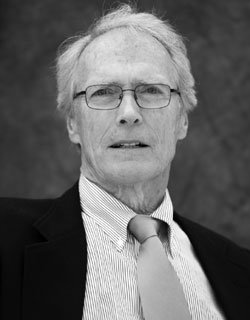
할리우드의 유명 배우이자 감독인 클린트 이스트우드(Clint Eastwood)의 이름은 장소 aptronym의 대표적 예다.
(‘더 타임스’는 1880년 11월20일 최초로 이렇게 보도했다: “뉴 팔라스 사람들은 그들(지주나 관리인)을 보이콧하기로 결의하고 음식물 제공을 거부했다.” 1880년 12월1일 보이콧 대위는 관리인 자리를 그만두고 가족과 함께 잉글랜드로 돌아갔다. 그는 1897년 65세의 나이로 죽었지만, 동사 ‘ostracize(추방하다)’와 의미가 같은 ‘boycott(보이콧하다)’이라는 동사를 만들어냄으로써 영원히 불멸하는 셈이다.)
martinet
‘규율에 엄격한 사람(특히 군인)’ ‘몹시 까다로운 사람’을 뜻하는 ‘martinet’은 프랑스 루이 14세 때의 교관 장 마르탱의 이름에서 비롯됐다.
In English, the term martinet is usually used not in reference to the whip itself, but rather him who would use it, a person who demands strict adherence to set rules, especially such a person in the military. In an extended sense, a martinet is a person for whom rules and etiquette are paramount.
(영어에서 martinet은 보통 채찍(whip) 자체를 의미하기보다, 그것을 자주 사용하는 사람, 그러니까 정해진 규칙을 엄수할 것을 요구하는 사람 특히 그러한 군인을 가리킨다. 넓은 의미에서 보면, martinet은 규칙과 예의범절 지상주의자다.)
This sense of the word reputedly comes from the name of Jean Martinet, Inspector General of the army of Louis XIV(one of the first great drill masters of modern times, died 1672). It was the drill master who revolutionized the early modern army by instituting a standardized system capable of turning raw recruits into a disciplined fighting force, thereby eliminating the mercenaries and soldiers-of-fortune who had been the mainstays of earlier armies. History records that Martinet was eventually killed by friendly fire while leading an infantry assault at the siege of Duisburg. Whether or not this was entirely accidental is, of course, a matter of conjecture.
(이 단어는 루이 14세 때 군대 감찰감이었던 장 마티넷(Jean Martinet)-근대의 가장 엄한 교련교관 중 한 사람으로 1642년 사망-에서 유래했다고 한다. 초기 군대의 근간이었던 용병을 없애는 대신 신병을 훈련된 전투병으로 바꾸는 정규 제도를 도입함으로써 근대 초기 군대를 혁명적으로 변화시킨 사람이 바로 이 교련교관이다. 기록에 따르면 마티넷은 뒤스부르크(Duisburg)를 포위 공격할 때 보병돌격대를 지휘하다 아군에 의한 오폭(誤爆)으로 사망했다. 이것이 순전히 우발적인 사고였는지는 추측으로만 남아 있다.) ※ a soldier of fortune: 용병(mercenary), friendly fire: 아군에 의한 오발(오폭), Duisburg: 라인 강과 루르 강이 합류하는 곳에 있는 독일의 도시
America
Who was America named after? 누구의 이름을 따서 ‘아메리카’라고 명명했는가?
사전엔 비야르니 헤르욜프손(Bjarni Herjolfsson)이 ‘아메리카 대륙을 최초로 발견한 사람으로 알려진 유럽인(the first known European discoverer of the mainland of the Americas)’으로 기록되어 있다. 노르웨이의 항해가였던 이 사람은 986년에 아메리카에 닿았다. 하지만 아메리카 대륙이 본격적으로 주목받은 건 콜럼버스의 서인도 항로 발견(1492년) 이후다.
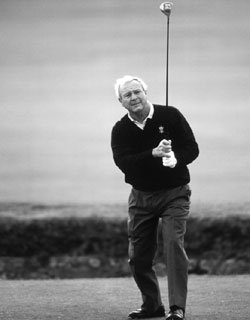
세계를 누비는 프로 골퍼 아놀드 파머(Arnold Palmer)의 이름엔 ‘성지순례자’란 의미가 담겨있다.
그는 1503년 라틴어로 된 ‘Mundus Novus’라는 소책자를 펴냈다. Mundus Novus는 영어로 New World와 같은 의미다. 그는 이 책에 “The land reached by Columbus, was really a New World(콜럼버스가 도착한 땅은 실로 새로운 세계였다)”고 썼다. 베스푸치는 라틴어 제목을 단 책을 내면서 자신의 이름도 ‘Americus Vespucius’라고 라틴어로 바꿔 썼다. 그리고 독일의 지도제작자 마틴 발트세뮬러(Martin Waldseemuller)가 1507년 세계지도를 만들면서 신대륙을 아메리쿠스(Americus)의 여성형인 아메리카(America)라고 명명했던 것이다. 대자연을 영어로 Mother Nature라고 한다. 흔히 자연은 어머니와 같다고 하는데 같은 맥락이다. 아시아(Asia), 유럽(Europe), 아프리카(Africa) 등의 대륙명은 모두 여성형이다.
콜럼버스는 1506년 5월21일 죽는 순간까지 자신이 발견한 곳이 아시아의 일부라고 믿었다. 결국 이 대륙의 이름은 콜럼버스와 인식을 달리해 ‘신대륙’이라고 주장한 아메리쿠스의 차지가 됐다. 원래 아메리카는 남아메리카를 가리켰으나 네덜란드 지리학자 메르카토르(Gerardus Mercator)가 1538년에 만든 세계지도에 아메리카 북쪽의 신대륙을 북아메리카로 표시하면서부터 북쪽 신대륙마저 아메리카로 칭하게 됐다.
sandwich
존 몬터규(John Montague)는 1729년에 샌드위치 백작 4세(4th Earl of Sandwich)가 되므로 ‘샌드위치 경’으로 불리기도 한다. 그는 카드놀이에 열중한 나머지 식사하는 것마저 귀찮아했다. 그래서 버터를 바른 두 장의 빵에 야채나 구운 고기를 넣어 먹으면서 게임을 계속했다.
The modern sandwich is certainly named after Lord Sandwich. Contem-porary accounts refer to the sandwich often with a capital ‘S’ and date the invention to 1762. However, the exact circumstances of the invention are still the subject of debate. A rumor in a contemporary travel book called Tour to London by Pierre Jean Grosley formed the popular myth that bread and meat sustained Lord Sandwich at the gambling table. If the popular myth of the sandwich being created at the gambling table is true, then it is likely that this gambling session was in a room in Hinchingbrooke House, where he was living at the time.
(오늘날의 샌드위치는 샌드위치 경의 이름을 딴 것이 분명하다. 당시 기록을 보면 샌드위치를 가리킬 때 종종 대문자 S를 쓰고, 처음 사용된 시점은 1762년으로 거슬러 올라간다. 하지만 이 말이 처음 사용된 정확한 정황은 여전히 논란의 대상이다. 그로슬레(Pierre Jean Grosley)가 쓴 ‘런던 여행’이라는 당시 여행기에 기록된 소문으로 인해 샌드위치 경이 도박 테이블에서 고기 넣은 빵을 먹으면서 게임을 계속했다는 유명한 신화가 만들어졌다. 이 유명한 신화가 도박 테이블에서 비롯된 것이 사실이라면, 이 도박판은 힌칭브루크 저택(Hinchingbrooke House)에서 벌어졌다. 당시 그가 거기 살았기 때문이다.)
John Hancock
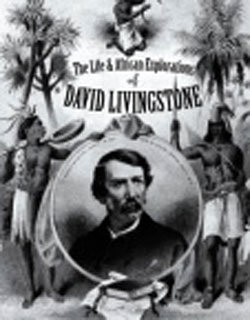
수년간 행방이 묘연했던 오지 탐험가 리빙스턴이 직접 쓴 여행기.
John Hancock(1737~1793) was President of the Second Continental Congress and of the Congress of the Confederation, the first Governor of Massachusetts, and the first person to sign the United States Declaration of Independence. Hancock was the only one to sign the Declaration of Independence on the fourth of July; the other 55 delegates signed on August 2nd. According to popular legend, he signed his name largely and clearly to be sure King George III could read it without his spectacles.
(존 핸콕은 제2기 대륙회의 의장과 연반회의 의장이었으며, 매사추세츠 초대 주지사였고, ‘독립선언서’에 처음으로 서명했다. 핸콕이 유일하게 7월4일에 독립선언서에 서명했고, 나머지 55명 대표는 8월2일에 서명했다. 전해오는 이야기에 따르면 그는 영국 왕 조지 3세가 안경을 쓰지 않고도 확인할 수 있도록 서명을 크고 분명하게 했다.)
So completely did it overshadow the autographs of the other founding fathers that the term ‘John Hancock’ has become synonymous with signature. This caused his name to become, in the United States, an eponym for signature. However, other examples suggest that Hancock always wrote his signature this way.
(결국 그의 서명이 다른 미합중국 헌법 제정자들의 서명에 비해 확실히 도드라져 보였고, ‘John Hancock’은 서명과 동일한 의미를 갖게 됐다. 이렇게 해서 미국에서 그의 이름이 signature(서명)를 의미하는 에포님이 (eponym)이 됐다. 다른 경우를 보더라도 핸콕은 항상 그런 식으로 서명했다.)
An alternate expression commonly used as a synonym for signature is John Henry. In the West, a half century and more later, the phrase became altered to John Henry, and nobody knows quite why.
(signature(서명)의 동의어로 자주 쓰이는 또 다른 표현이 John Henry다. 서부에서는 반세기 남짓 지난 후 John Hancock이 John Henry로 바뀌었다. 그러나 어느 누구도 왜 그렇게 되었는지는 알지 못한다.)
▼ Aptronym(앱트러님)
Aptronym, a word allegedly coined by United States newspaper columnist Franklin P. Adams, refers to a name that is aptly suited to its owner. Fictional examples of aptronyms include Mr. Talkative and Mr. Worldly Wiseman in John Bunyan´s The Pilgrim´s Progress.
(미국의 신문 칼럼니스트 프랭클린 애덤스가 만들었다고 알려진 aptronym은 어떤 사람에게 딱 들어맞는 이름을 가리킨다. 소설에 등장하는 aptronym으로는 존 버니언의 ‘천로역정’에 나오는 수다쟁이씨(Mr. Talkative)와 세속현자씨(Mr. Worldly Wiseman)가 있다.)
또 다른 aptronym으로는 ‘Billy Sunday(1862~1935)’가 있다. 독일계 미국인으로 야구선수 생활을 하다 기독교 전도사로 변신해 명성을 떨친 인물이다. 기독교 전도사의 성이 주일(Sunday)인 경우다. 빌리 선데이에 관한 재미있는 일화가 있다.
Evangelist Billy Sunday, during a revival meeting, asked all couples who had never quarrelled to step up in front of him. A number of couples arose and came before the famous preacher, who thereupon threw his hand over their heads and cried out: “Now let us pray to our God to bless these damned liars!”
(복음전도사 빌리 선데이는 신앙부흥전도 집회에서, 다퉈본 적이 없는 부부가 있으면 앞으로 나와보라고 했다. 많은 부부가 일어서서 그 유명한 목사 앞으로 나왔다. 그러자 목사는 그들의 머리 위에 손을 뻗고 이렇게 외쳤다. “주께서 이 빌어먹을 거짓말쟁이들에게 축복을 내리시도록 기도합시다.”)
smith(=metalwork)의 어원
‘I´m Goldsmith’ 하면 ‘제 이름은 골드스미스입니다’이지만, ‘I´m a goldsmith’ 하면 ‘제 직업은 금 세공인입니다’이다. 이밖에 Tinsmith(주석세공인), Gunsmith(총기제작자), Locksmith(자물쇠제작자), Blacksmith(대장장이·제철공), Whitesmith(양철세공인), Bladesmith(칼 대장장이) 등이 있다. 사람 이름으로 익숙한 smith가 이처럼 보통명사화한 까닭은 무엇일까.
A smith is a person involved in the shaping of metal objects. In pre-industrialized times, smiths held high or special social standing since they supplied the metal tools needed for farming (especially the plough) and warfare. The word smith is cognate with the somewhat archaic English word, “smite”, meaning “to hit” or “to strike”. Originally, smiths practiced their crafts by forming metal with hammer blows. As an English suffix, -smith connotes a meaning of specialized craftsmen. For example, wordsmith and tunesmith are words used to describe the skill of a writer or a songwriter, respectively.
(smith는 금속으로 물체를 만드는 데 종사하는 사람이다. 산업화되기 전 smith는 농업(특히 경작)과 전쟁에 필요한 금속 도구를 제공했기에 사회에서 높거나 특별한 지위에 있었다. smith란 단어의 어원은 ‘때리다’ ‘치다’를 의미하는 다소 고풍스러운 단어 smite와 동일하다. 원래 smith는 쇠망치로 때려서 금속에 모양을 내는 걸 업으로 한다. 영어의 접미사 -smith는 ‘장인(匠人)’의 의미를 내포한다. 예를 들어 wordsmith와 tunesmith는 각각 문필가나 작곡가의 능숙함을 표현할 때 사용된다.)
그 밖의 직업 aptronym으로는 Miller(제분업자), Cook(요리사), Ward(수위), Webb(직공), Baker(빵 굽는 사람), Butler(집사), Porter(짐꾼), Taylor(재단사), Turner(선반공), Wright(직공), Hunter(사냥꾼), Archer(활 쏘는 사람), Barber(이발사), Draper(포목상), Farmer(농부), Gardener(정원사), Carpenter(목수), Shepherd(양치기) 등이 있다.
장소 aptronym
영화배우 Natalie Wood나 Clint Eastwood, 비평가 Bernard Shaw 등은 모두 장소를 나타내는 단어를 포함하고 있다. 연유는 이렇다.
A way of distinguishing persons with the same name was to refer to them by the name of the location where they lived. If three men were all called John, one was referred to as John in the field, another as John by the wood, and the other as John under the hill. In this way surnames like Field, Forest, Wood, Shaw, Pond, Marsh, Ford, Brook, Hill, Cliff, Lane gradually came into use.
(같은 이름을 가진 사람을 분간하는 방법의 하나는 그들이 사는 곳을 부르는 것이었다. 만약 세 명의 존이 있으면, 한 사람은 ‘들판에 사는 존(John in the Field)’, 또 다른 사람은 ‘숲 옆에 사는 존(John by the wood)’, 그리고 나머지 한 사람은 ‘언덕 아래에 사는 존(John under the hill)’이라고 불렸다. 이런 식으로 해서 들판(Field), 산림(Forest), 숲(Wood), 잡목숲(Shaw), 못(Pond), 늪(Marsh), 여울(Ford), 시내(Brook), 언덕(Hill), 벼랑(Cliff), 골목(Lane) 등이 성(姓)으로 쓰이게 됐다.)
기타 aptronym
미국 대통령 트루먼(Truman : 진실한 사람)
‘베니스의 상인’의 대금업자 샤일록(Shylock : 의심 많은 자물쇠)
우주비행사 암스트롱(Armstrong : 팔이 강한 사람)
미국 시인 롱펠로(Longfellow : 키가 큰 사람)
영국 시인 워즈워스(Wordsworth : 단어의 가치를 아는 사람)
미국 여배우 숀 영(Sean Young : 쌩쌩한 사람)
미국의 프로골퍼 아놀드 파머(Arnold Palmer : 성지순례자)
영국의 풍자작가 조너선 스위프트(Jonathan Swift : 날쌘 사람)
◈ Dr. Livingstone I presume? (죽지 않고 살아계셨군요!)
‘Dr. Livingstone I presume!’을 직역하면 ‘리빙스턴 박사님이시죠!’다. 그러나 영어권에선 아주 오랜만에 만난 사람에게 이 표현을 쓴다. 우리나라에서도 오랫동안 소식이 끊겼던 사람을 만나면 ‘죽지 않고 살아 있었구나’ 하는 말을 하는데 비슷한 의미다. 이 표현은 Livingstone이란 이름을 가진 한 사나이의 행적에 딱 들어맞는 aptronym이다.
리빙스턴(David Livingstone)은 영국의 의료선교사로 1840년 남아프리카에 파견돼 오지에서 전도사업을 하던 중 남아프리카를 탐험했다. 1871년 온갖 어려움을 겪으며 콩고 강 지류에 이르렀으나 열병에 걸려 사경을 헤매다 스탠리의 수색탐험대에 극적으로 구출됐다.
리빙스턴을 구한 스탠리(Sir Henry Morton Stanley)는 영국 출신의 미국 언론인이자 탐험가다. 1869년 ‘뉴욕 헤럴드(New York Herald)’에 리빙스턴 인터뷰 기사를 쓰기로 계약하고 아프리카로 출발했다. 당시 리빙스턴은 세 번째 탐사에 나선 뒤 1867년부터 소식이 끊긴 상태였다. 스탠리는 1871년 3월 동아프리카의 노예무역항인 잔지바르(Zanzibar)를 출발, 11월에 탕가니카(Tanganyika) 호수 부근의 우지지(Ujiji)에서 극적으로 리빙스턴을 만났다. “Dr. Livingstone I presume(리빙스턴 박사님이시죠)!”라고 한 스탠리의 첫 인사는 이후 그 자신의 기사를 통해 유럽과 미국 사회에 널리 알려졌다. 스탠리는 탐험을 계속하겠다는 리빙스턴을 남겨두고 돌아와, 자신의 경험을 ‘뉴욕 헤럴드’에 기고하며 명성을 쌓았다.
스탠리가 쓴 여행기 ‘How I Found Livingstone(나는 어떻게 리빙스턴을 찾았는가)?’에 수록된 장면을 보자.
I walked deliberately to him, took off my hat, and said, ‘Dr. Livingstone, I presume?’ ‘Yes,’ said he, with a kind smile, lifting his cap slightly. I replace my hat on my head and he puts on his cap, and we both grasp hands, and I then say aloud, ‘I thank God, Doctor, I have been permitted to see you.’ He answered, ‘I feel thankful that I am here to welcome you.’
(나는 조심스럽게 그에게 다가가서 모자를 벗고 ‘리빙스턴 박사님이시죠!’라고 말했다. 그는 상냥하게 미소 지으며 모자를 약간 치켜들면서 ‘예’라고 말했다. 나도, 리빙스턴 박사도 다시 모자를 썼다. 우리 둘은 손을 움켜잡았고, 나는 큰소리로 ‘박사님을 뵙게 되어 하느님께 감사합니다’라고 말했다. 리빙스턴 박사는 ‘여기서 당신을 맞게 되어 고맙게 생각합니다’라고 대답했다.)
▼ Patronym(패트러님)
A patronymic, or patronym, is a component of a personal name based on the name of one´s father. A component of a name based on the name of one′s mother is a matronymic, or matronym. Each is a means of conveying lineage.
(patronym은 아버지의 이름에 근거한 인명 구성요소다. matronym은 어머니의 이름에 근거한 인명의 구성요소다. 어느 것이든 혈통을 계승하는 수단이다.)
아버지와 아들의 이름이 같으면 아버지 이름 끝에 Sr.(=Senior), 아들 이름 끝에 Jr.(=Junior)를 붙인다. 아버지, 아들, 손자까지 이름이 같으면 위에서부터 [I] [II] [III] [Ⅳ] [Ⅴ]순으로 내려온다.
이 숫자는 서수이므로 the First, the Second, the Third, the Fourth, the Fifth로 읽는다.
존 F. 케네디 일가가 patronym의 좋은 예다.
Joseph Patrick “Joe” Kennedy, Sr.(1888~1969) was a prominent United States businessman and political figure, the father of President John F. Kennedy and Senators Robert F. Kennedy and Edward Moore “Ted” Kennedy. Joseph Patrick Kennedy, Jr.(1915~1944) was the oldest of the nine children born to Joseph P. Kennedy, Sr. and his wife, Rose Fitzgerald Kennedy. Older brother of future President John F. Kennedy, he was expected to bear the family´s political hopes.
|
(조지프 패트릭 “조” 케네디(Sr.) (1888~ 1969)는 미국의 탁월한 실업가였으며 정치인이었다. 또한 그는 존 F. 케네디 대통령과 로버트 F. 케네디 상원의원 그리고 에드워드 무어 “테드” 케네디 상원의원의 아버지다. 조지프 패트릭 케네디(Jr)는 조지프 패트릭 “조” 케네디(Sr.)와 로즈 피츠제럴드 사이에 태어난 9명의 자녀 중 첫째였다. 훗날 대통령이 되는 존 F. 케네디의 형인 그는 가문의 정치적 희망을 이룰 것으로 기대됐다.)
누구누구의 자손임을 나타내는 성(姓)도 있다. Johnson = John´s son, Peterson = Peter´s son, Stevenson = Steven´s son, Williamson = William´s son, Phillips = Philip´s son, Stevens = Steven´s son, Williams = William´s son, McCain = Son of Cain, MacDonald = Son of Donald, O′connor = Son of Connor

















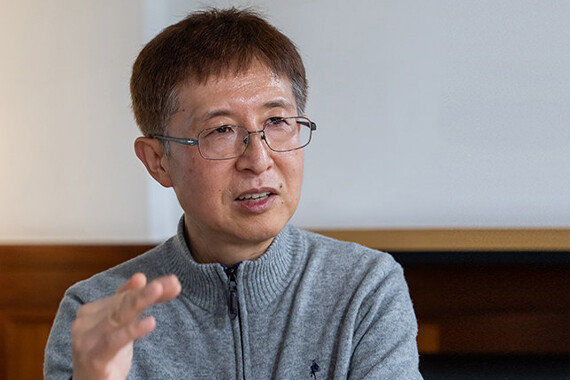
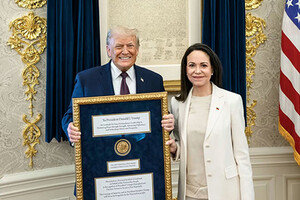



![[신동아 만평 ‘안마봉’] 2026년 이재명 대통령의 ‘부동산 행상’](https://dimg.donga.com/a/380/211/95/1/ugc/CDB/SHINDONGA/Article/69/9d/5f/99/699d5f9911b7a0a0a0a.png)

![[영상] 김다현 “언제나 내 편인 ‘얼씨구다현’과 함께 붉은 말처럼 달리렵니다”](https://dimg.donga.com/a/380/211/95/1/ugc/CDB/SHINDONGA/Article/69/8b/df/02/698bdf022269d2738e25.jpg)